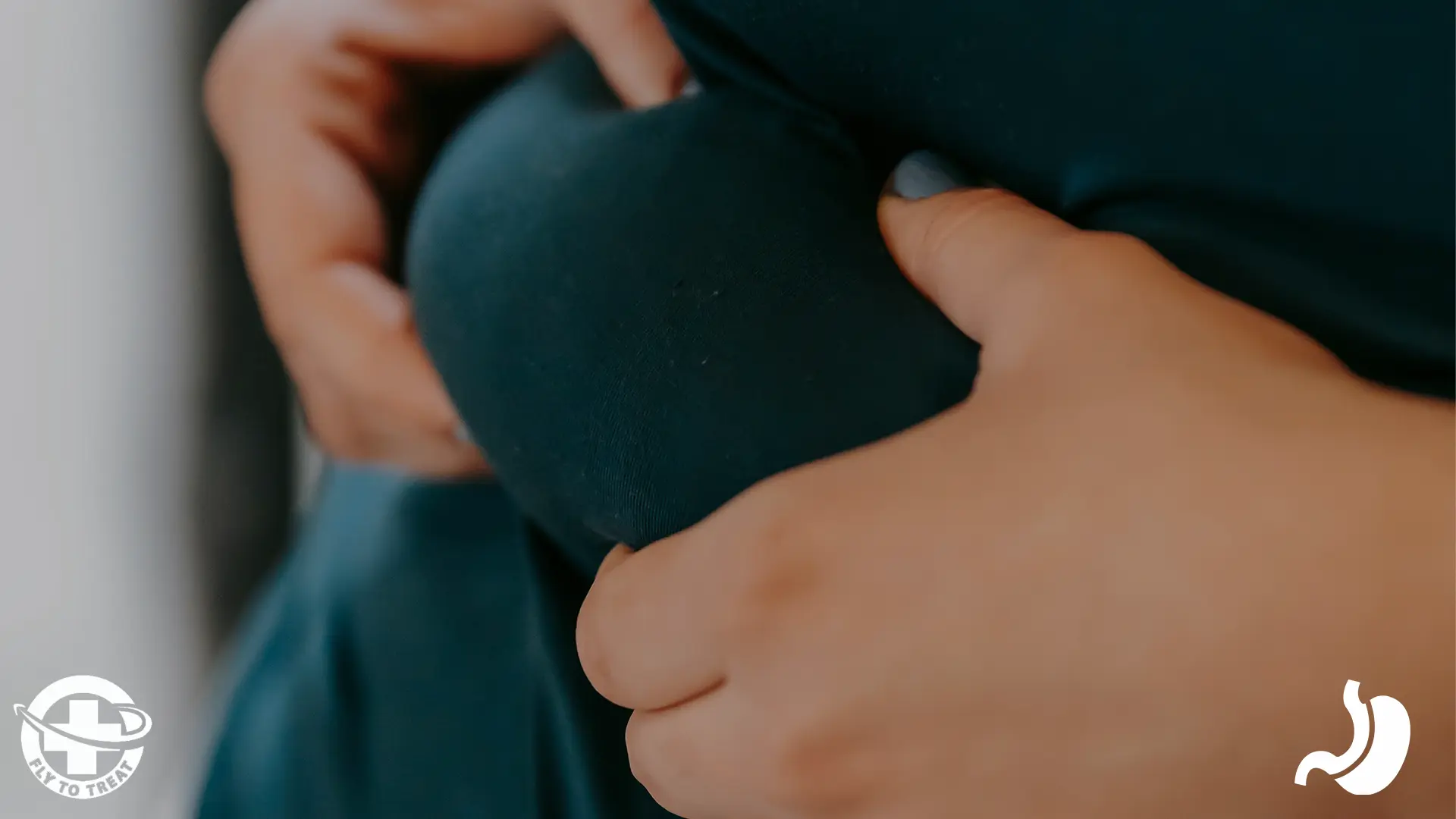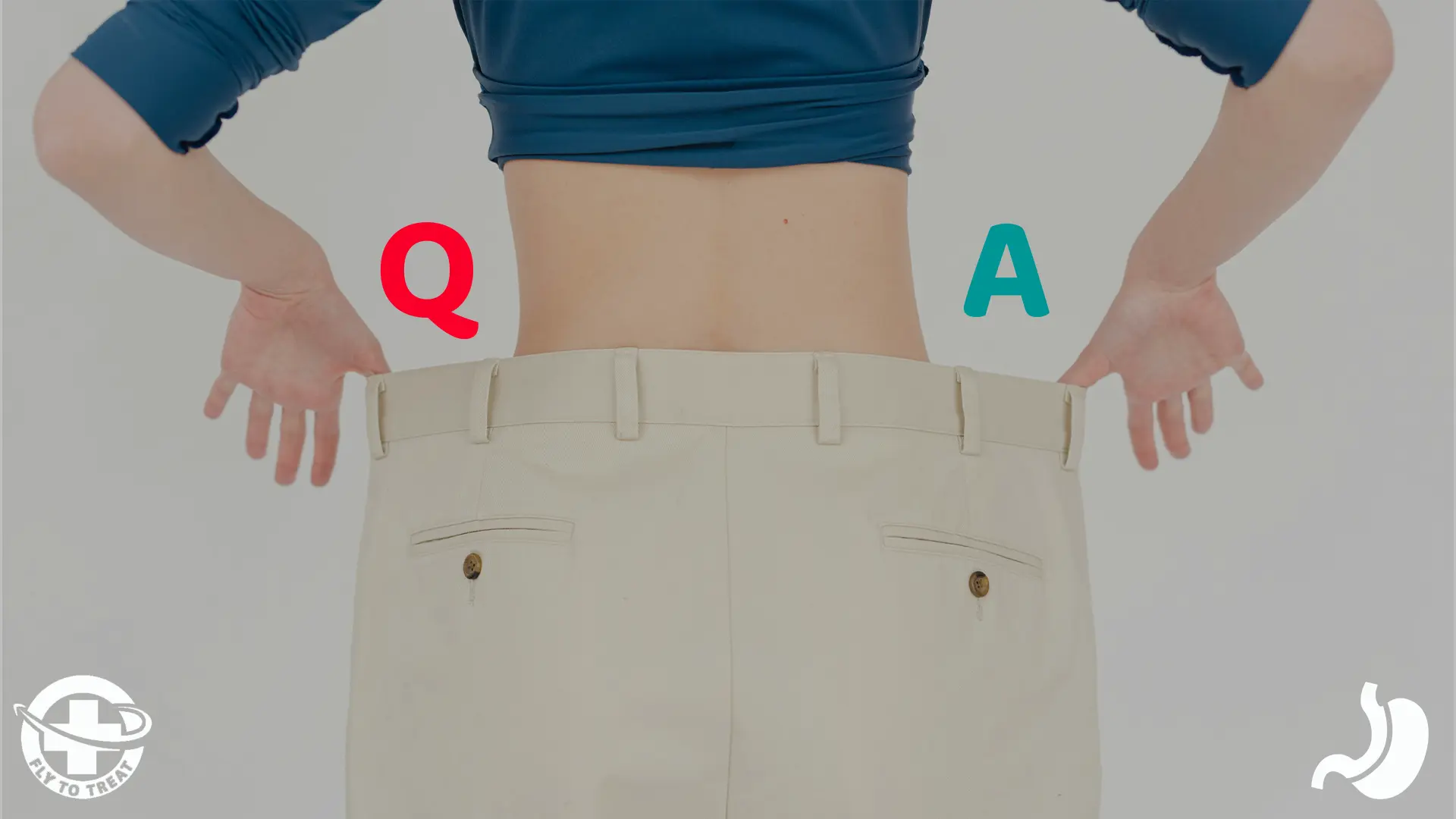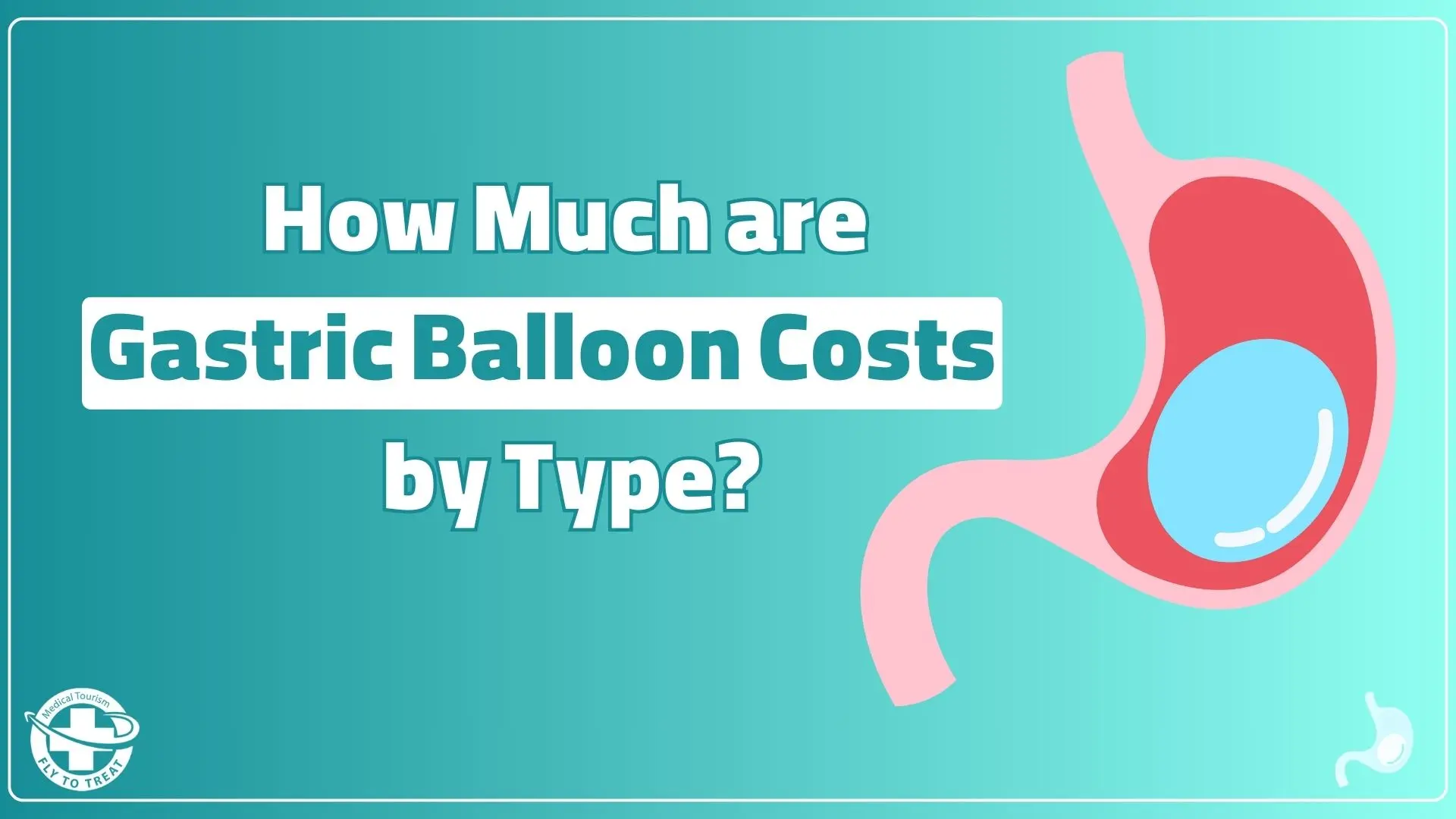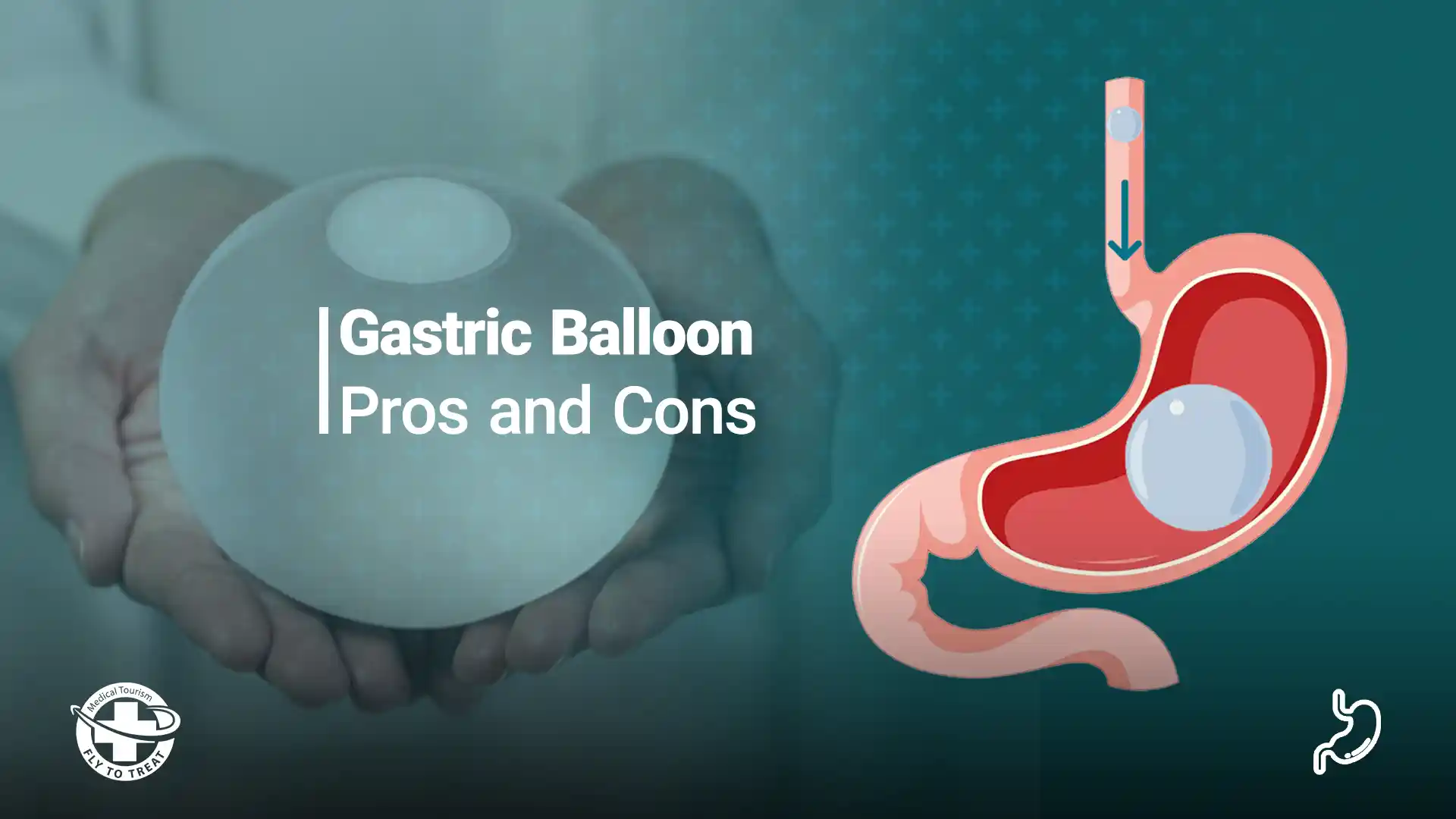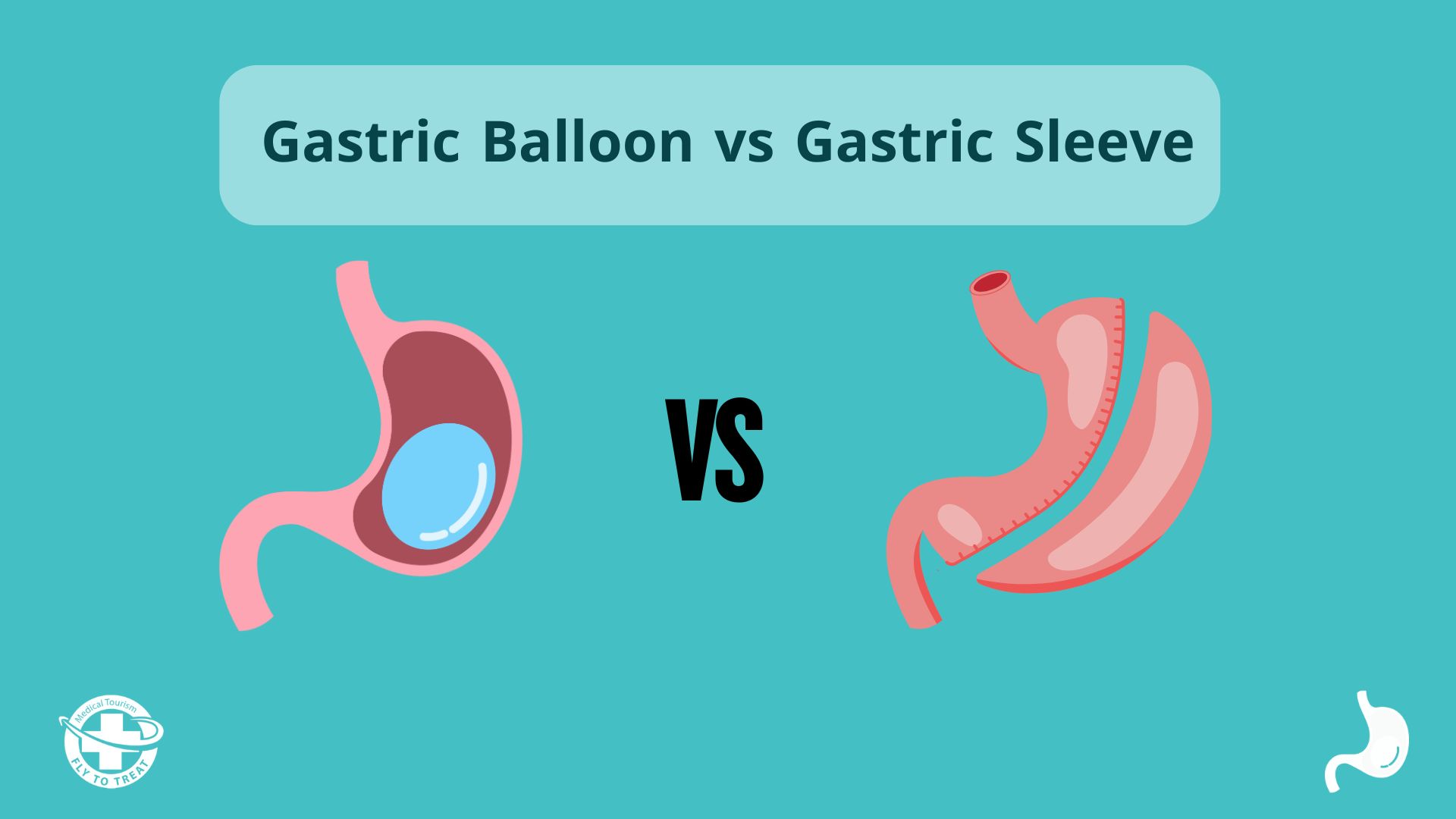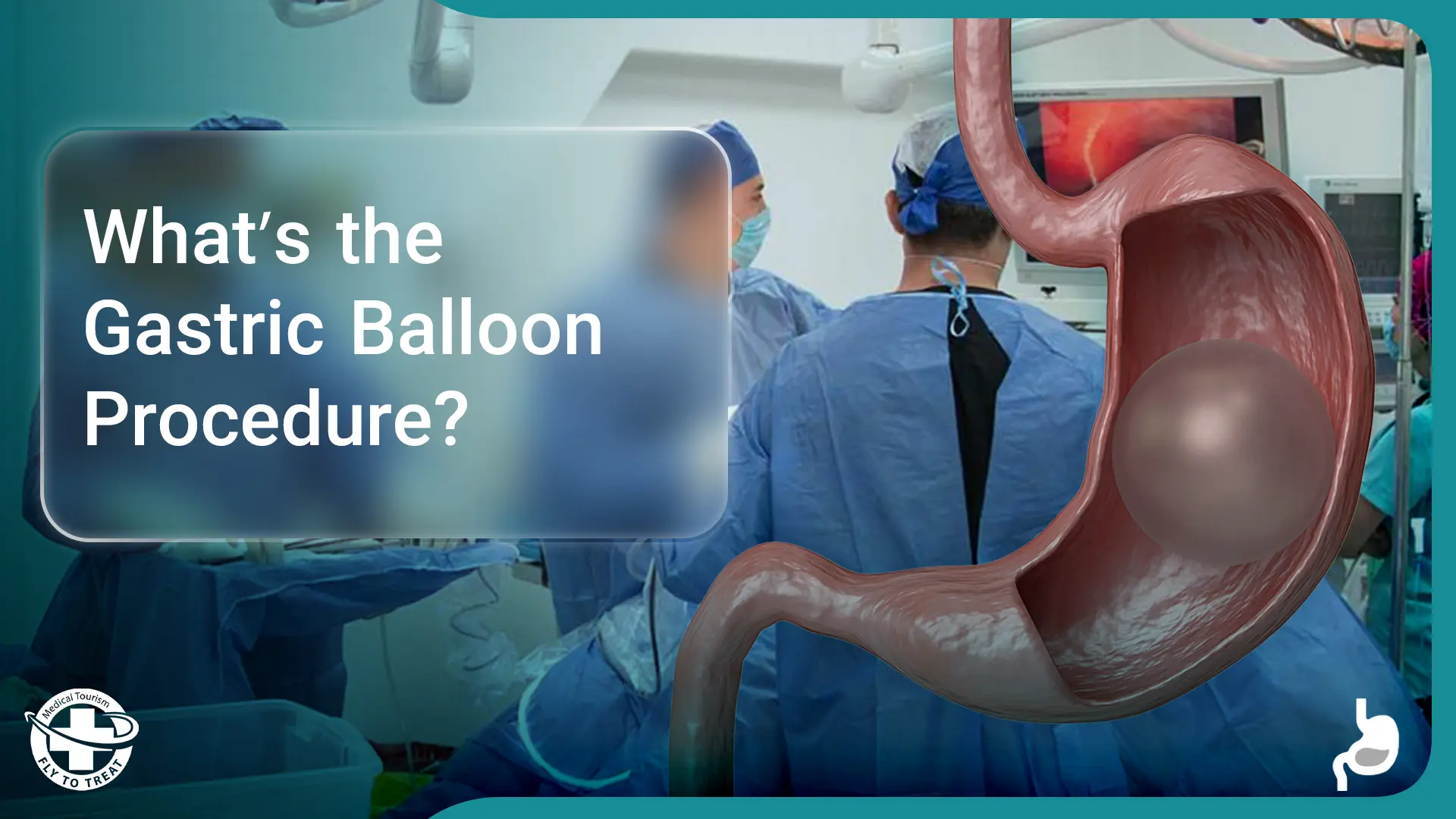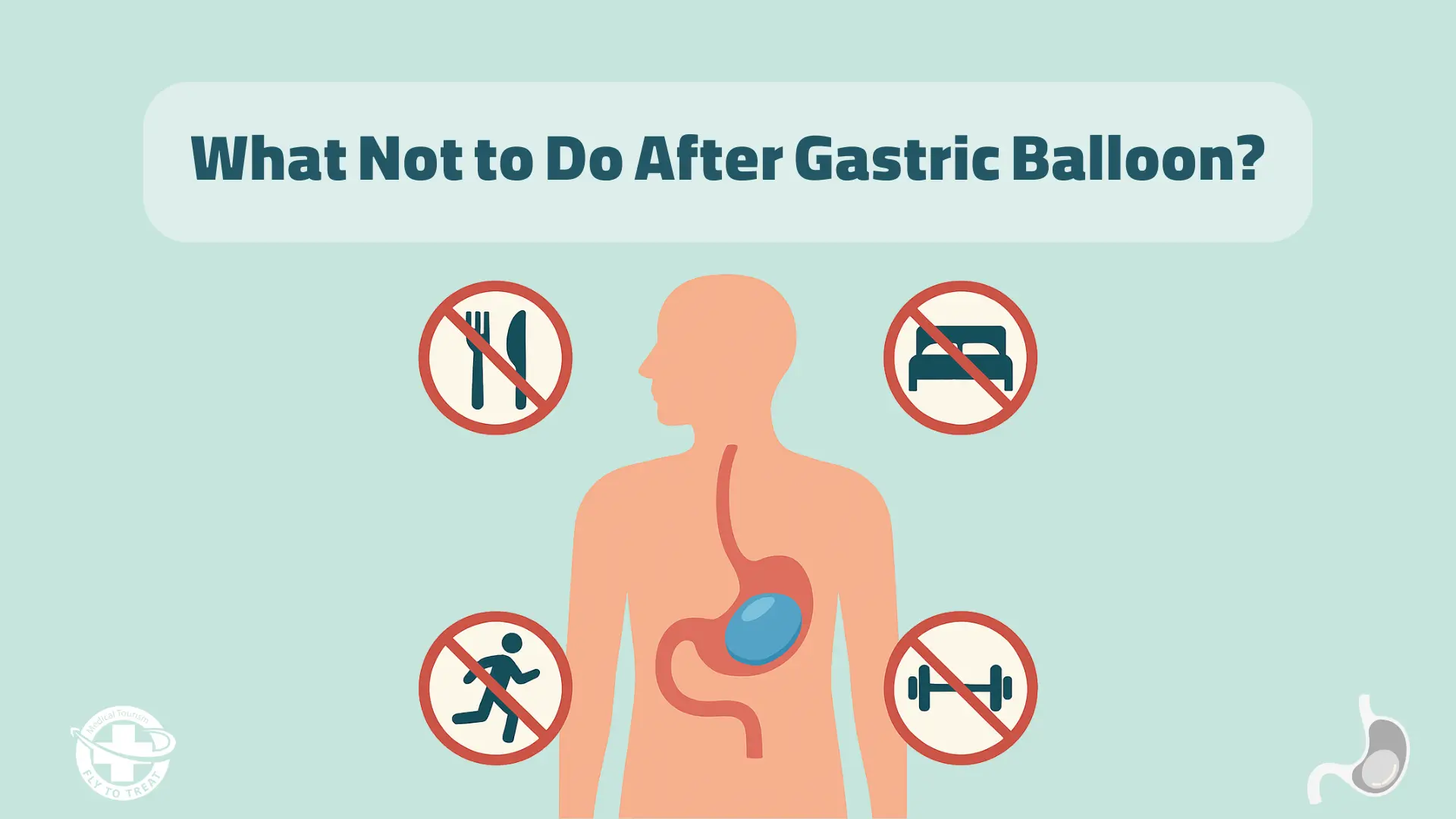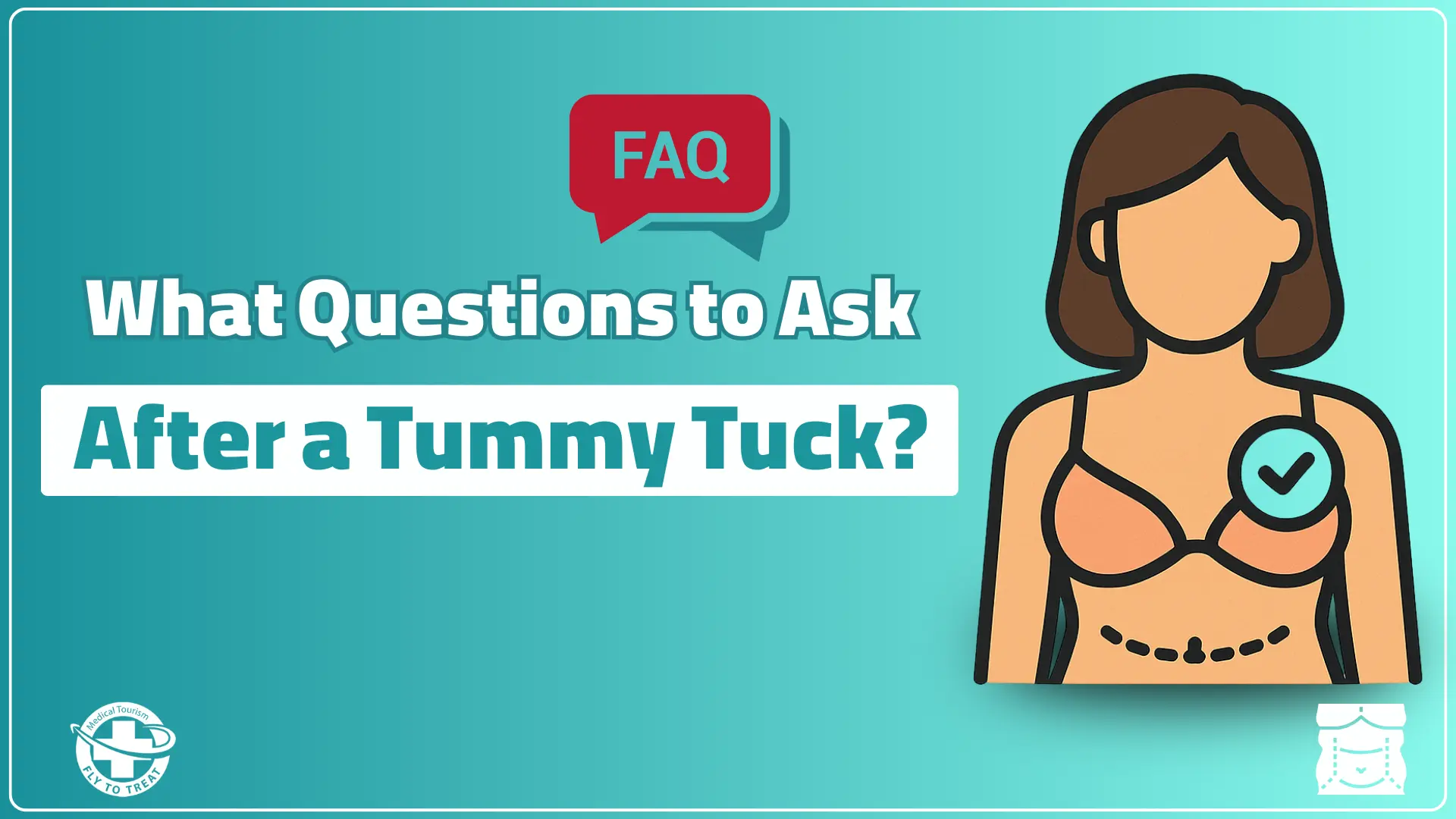
What Questions to Ask After a Tummy Tuck?
Even though currently tummy tucks cosmetic surgery is quite common, many patients frequently have tummy tuck FAQs and no idea what to anticipate throughout their recovery. Many people may find the tummy tuck procedure easier if they know how long tummy tuck recovery will take.
This guide will discuss tummy tuck facts and answer some of the standard tummy tuck FAQs. However, we invite you to mention your tummy tuck questions to ask doctor in the comment section at the bottom of this page. Our expert team will help you with your concerns and answer your questions so that the tummy tuck questions and answers will be informative and useful for other readers as well.
You may also want to learn: “How many different types of tummy tucks are there?”
FlytoTreat is a medical tourism facilitator with a specialty in various medical conditions and treatments, such as infertility, organ transplants, weight loss treatment, and plastic and cosmetic surgeries such as tummy tucks.
If you are concerned about your medical treatment and seek a medical tourism company to help you handle your medical issues with the best quality and most affordable treatments in your desired destinations, FlytoTreat is here to back you up. Need a transformation? Click here.
Table of Contents
- How much weight can you lose with a tummy tuck?
- How long do tummy tuck results last?
- How long does tummy tuck swelling last?
- How long should I take off work after a tummy tuck?
- How long does the tightness last after a tummy tuck?
- How long does tummy tuck recovery take?
- How much downtime is required after a tummy tuck?
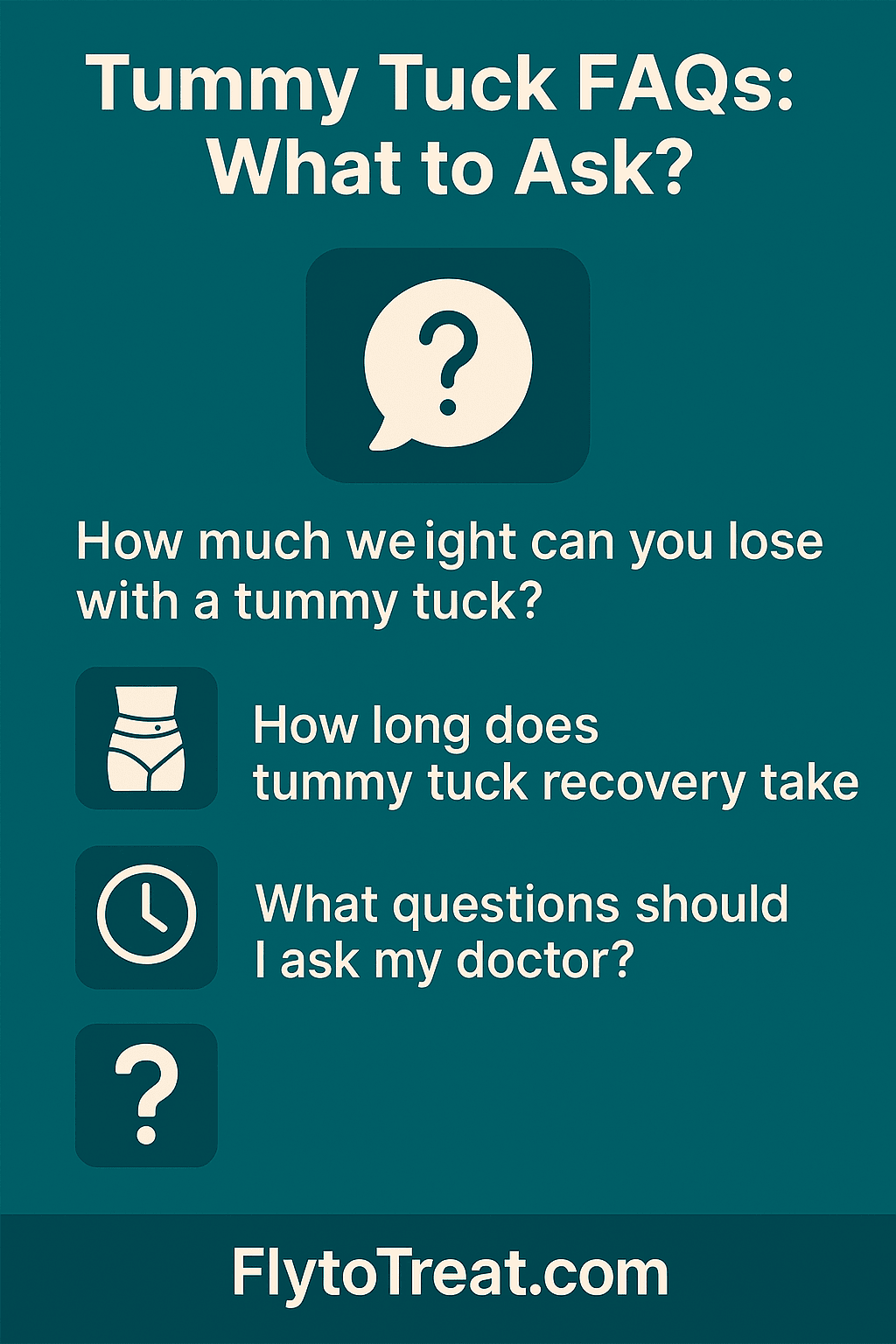
How much weight can you lose with a tummy tuck?
Almost nothing is the short answer to this question. We should remind you that, as a matter of fact, a tummy tuck is not a type of surgery used to lose weight. This method is a kind of cosmetic surgery that removes extra skin and fat from the abdomen to reshape and improve the stomach's appearance.
Therefore, only the extra fat and loose skin surrounding your abdomen will be cut away following a tummy tuck, giving the appearance of a much firmer and flatter stomach.
However, there is a variety of the newest weight loss surgery methods for losing weight that you can choose based on your physical and financial conditions.
For learning about weight loss options, read “Sleeve Surgery vs. Tummy Tuck.”
However, some people may lose a little weight as a result of the operation, for which there is no guarantee, though. As a result, each person will see a different average weight loss after an abdominal tuck; some may lose a size or two in clothing, while others may maintain their current weight but have a more toned figure.
According to a study published in Plastic and Reconstructive Surgery, 70% of patients lost more weight than they had before the surgery a year following their operation after having a stomach tuck. One year following the operation, individuals lost an average of 4.5% of their initial BMI.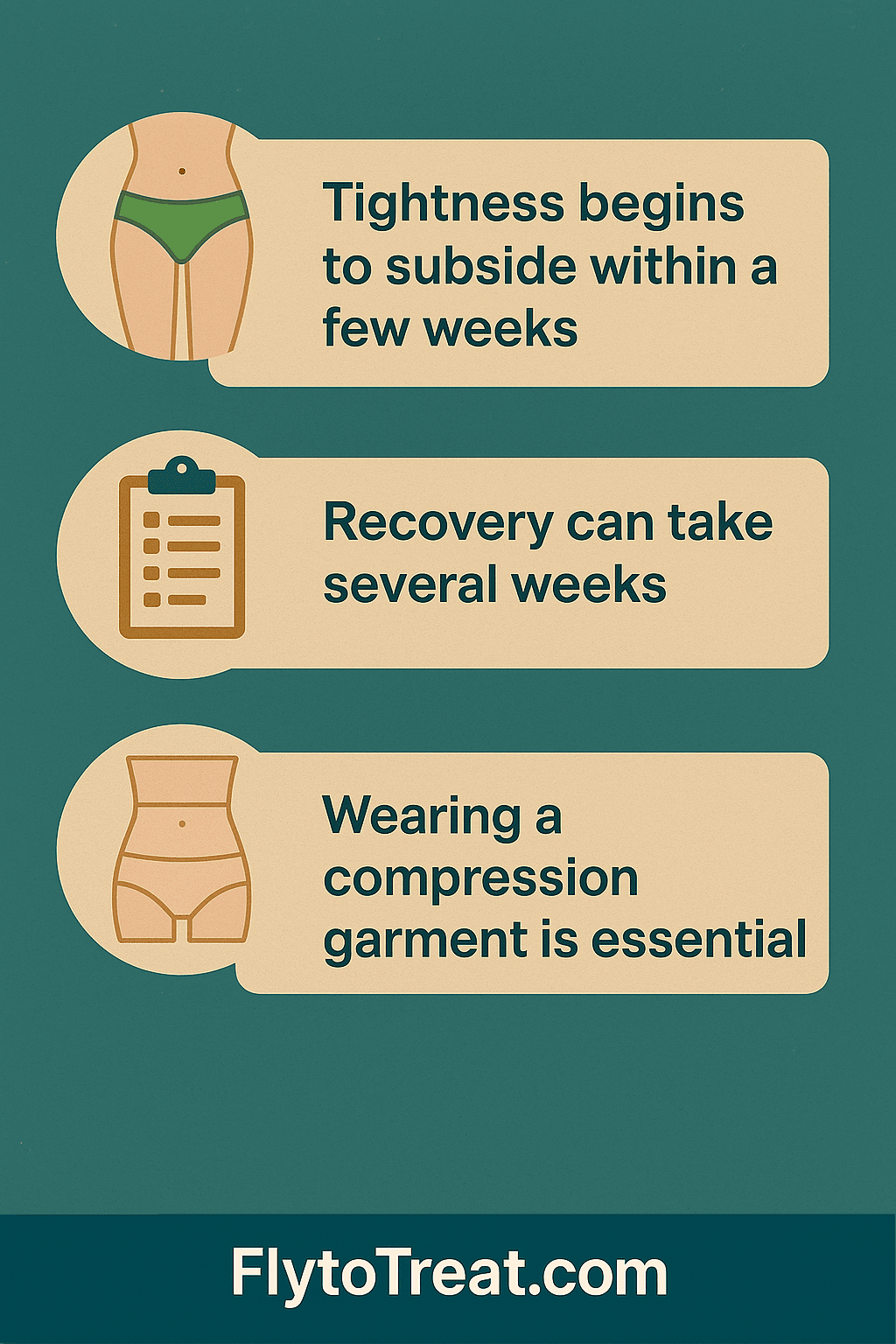
How long do tummy tuck results last?
Tummy tuck results may remain for a very long time if you lead an active, healthy lifestyle and keep your weight stable. Your stomach will appear considerably flatter and firmer after a tummy tuck since the extra fat and loose skin surrounding it will be eliminated.
After a tummy tuck, your new appearance should stay constant, but that's if you maintain your current weight with a healthy diet and exercise routine. Keep in mind that a tummy tuck is not a miracle treatment that keeps you thin forever; rather, it is a technique that adds contour to your belly and eliminates loose skin.
How long does tummy tuck swelling last?
One of the other tummy tuck questions to ask doctor is about swelling. Following the tummy tuck, swelling is most noticeable during the first four to six weeks and then gradually goes away over the following six to twelve months.
By rupturing the lower abdomen's blood and lymphatic vessels, the operation only affects the area beneath the skin and fatty tissue, allowing fluid to escape upward until new vessels grow.
While minor swelling might last up to a year and get worse with extended standing or exercise, the initial swelling goes away in two months. Before starting activity again, a compression binder is usually worn for six weeks to help control swelling. New vessel development stops further variations in swelling after a year.
How long should I take off work after a tummy tuck?
After two to three weeks, many patients discover they are prepared to resume their jobs. Depending on the type of your work, this could change. If your job is physically demanding rather than one that allows for greater lack of movement, you might require more time off or return to work on light or modified tasks.
Therefore, patients can usually resume light work after two weeks of recuperation, but in order to preserve the internal sutures that support your abdominal muscles, you should refrain from bending and twisting for at least four to six weeks.
Even though you will probably feel more like yourself by the end of the second week, you still must resist the desire to push yourself too much. You may maximize your tummy tuck results and avoid healing setbacks by strictly adhering to recovery instructions.
How long does the tightness last after a tummy tuck?
It may take six to twelve weeks for some people to experience no more tightness or associated symptoms. Tightness in the abdominal area is among the most frequent side effects following stomach tuck surgery. The tightening of the muscles and skin throughout the operation is the natural cause of this sensation.
Feeling tight is one annoying side effect to consider with the tummy tuck pros and cons, but within a few weeks following your treatment, the stiffness in your tummy tuck should start to lessen. After a stomach tuck, you need to schedule about two weeks off from work and six weeks off from vigorous exercise to recuperate.
What causes a pulling sensation after a tummy tuck?
Similar to other surgical procedures, abdominoplasty involves making cuts into the body. Naturally, some nerve damage results from this. Following a tummy tuck, many abdominoplasty patients report numbness across the lower abdominal region as a result of damaged nerves in the region.
Over time, the patient will gradually regain sensation as the nerves begin to reestablish their correct paths. Because the skin has been removed and reassembled, patients who have had stomach tucks may also feel tight in their abdomen.
Furthermore, a sense of tightened tissue after recuperation may result from the tightening of muscles and what exactly is done during a tummy tuck. Remember that this tightness and pulling sensation is a natural part of the healing process, even though it may cause you anxiety.
These side effects can linger for up to 12 weeks after an abdominoplasty for most patients. The correct healing of the nerves in the abdomen region might sometimes take up to a year. This type of discomfort is very unlikely to come back once the nerves have returned to their normal sensory function.
Would you like to read “Who should not get a tummy tuck”?
What is the treatment for tightness feeling after a tummy tuck?
The process of nerve regeneration is natural and has a natural timeline. However, by participating in the refresher training, you might be able to accelerate this process.
We advise you to gently massage your abdomen with objects of various textures. This could contain items like cotton, lotion, washcloths, and loofahs. Stimulating the nerves to locate their correct paths and heal considerably more quickly is the aim.
The surgeon could suggest drugs like Neurontin to people who have severe nerve soreness. Before using medicine to relieve pain and a pulling sensation following an abdominoplasty, make sure you have a prescription from your doctor and clear instructions.
How long does tummy tuck recovery take?
Among other tummy tuck frequently asked questions is about the recovery timeline. The healing period from the tummy tuck is not nearly as uncomfortable or stretched out as it used to be, despite popular assumptions. Patients can recover faster and with less discomfort thanks to new surgical and medical techniques.
However, the recovery period for each tummy tuck varies and is dependent on the scope of your surgery plan. Keep that in mind as you read the week-by-week recovery details below. Nonetheless, there is typically a very predictable rehabilitation period following a tummy tuck.
How much downtime is required after a tummy tuck?
After two to three weeks, you will start to recover well from your tummy tuck; however, it may take up to six months. After two weeks, most people are able to return to work, and four or five weeks later, they can resume their regular exercise regimen. Keep in mind that you must heal at your own rate, so allow your body to rest.
Recovery timeline following the tummy tuck procedure
The breakdown for a tummy tuck downtime period is as follows:
- You may be prescribed painkillers because you will probably be a bit uncomfortable during the first week. Although you will be urged to exercise in order to prevent blood clots, you will probably recover for a considerable amount of time in a bed or recliner that permits you to bend your knees.
- Therefore, we advise taking a week off from work (two weeks if your job involves manual labor). In order to promote drainage and lessen postoperative edema, you will be required to wear a compression garment for approximately six weeks.
- Following surgery, you might have drainage tubes in your abdomen for a few weeks; your plastic surgeon will eventually remove these tubes.
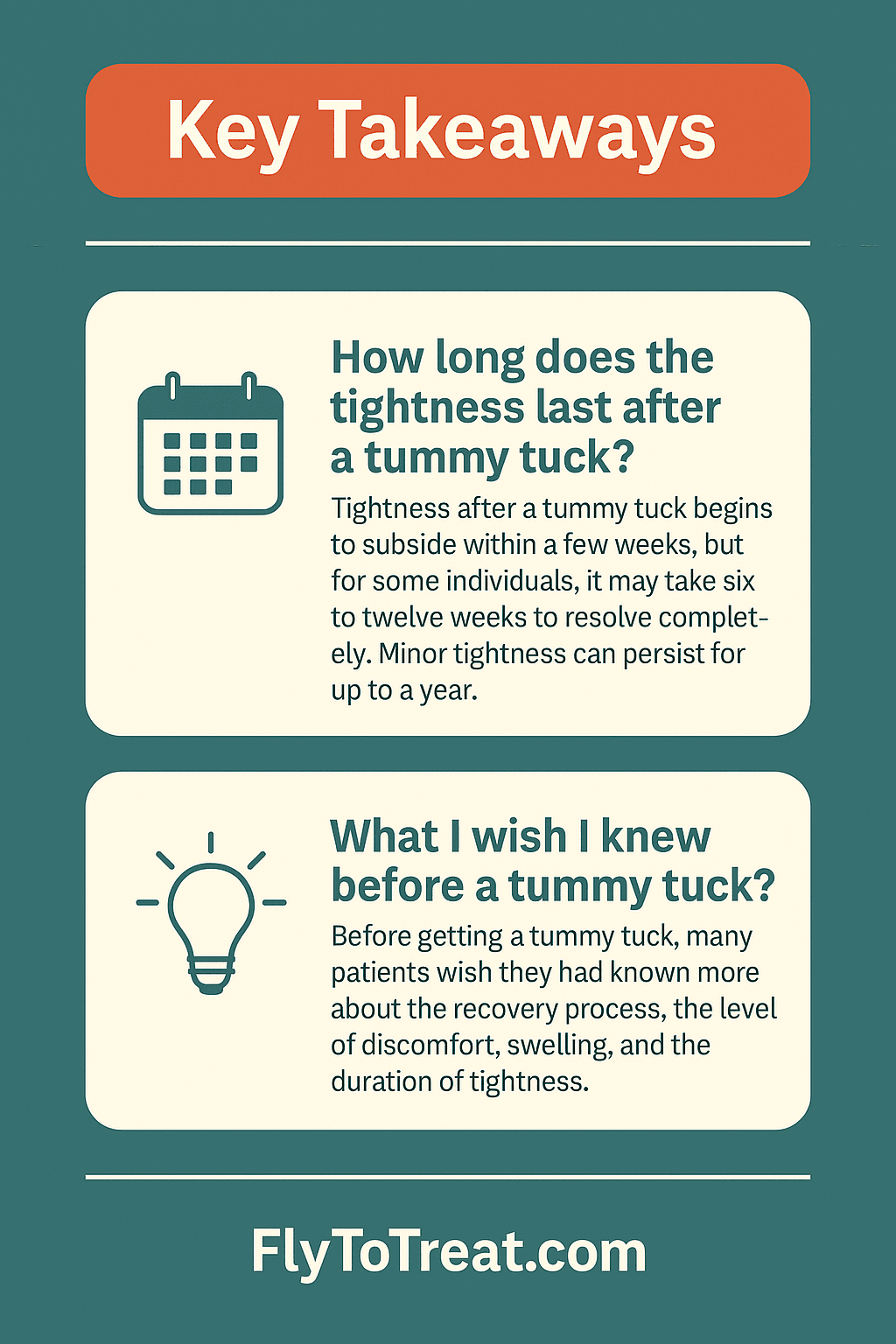
Conclusion
A smooth tummy tuck experience depends on your ability to comprehend the recovery period, any side effects, and long-term outcomes of tummy tucks. Making informed choices on your treatment and aftercare can be achieved by being prepared beforehand and asking the appropriate tummy tuck FAQ.
Please use the comments section to ask any tummy tuck FAQs or specific questions or issues you may still have; our team of experts is available to help. Should you be considering a stomach tuck as a part of your medical journey, FlytoTreat is prepared to help you identify the most suitable solutions for your requirements. Your transformation starts here.
MEDICALLY REVIEWED BY: Dr. Ali Bazazi
AUTHOR: FlytoTreat's team of Authors
17 April 2025 - Updated At: 12 April 2025
Related Articles
Related Services
great article thanks for information
Thank you so much
Comment







